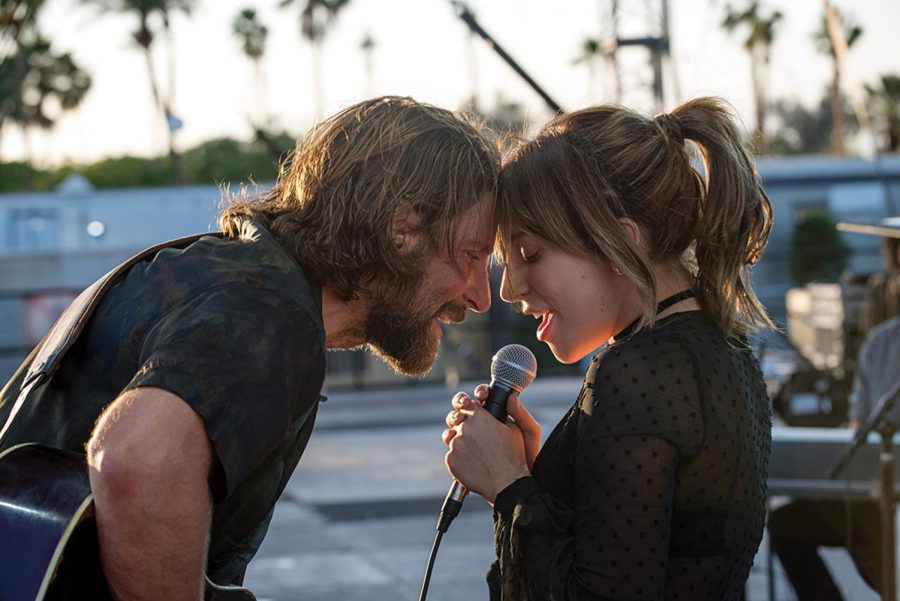The stunning acting and emotional script begin a movie star-making turn for Lady Gaga
Source: Neal Preston/Warner Bros/TNS
Bradley Cooper and Lady Gaga sing “Shallow” in one of the film’s climactic moments.
February 13, 2019
It’s a moment that transcends the film, the actors and even cinema itself. You know the one: Lady Gaga’s Ally, trepidation and anxiety evident in her shoulders, walks over to Bradley Cooper’s Jackson. She grabs the microphone with both hands, and delivers the guttural, electrifying string of vowels that has become synonymous with “A Star is Born”.
That’s the moment Ally fully gives herself over to the events of the plot she does not yet know, and it’s the moment I do too. “A Star is Born” seemed, from afar, to have the potential to go up in flames. Lady Gaga — she of the meat dress and the Super Bowl and rah rah ah ah ah — was playing opposite Bradley Cooper, who was essentially impersonating Sam Elliott’s voice with Elliott co-starring in the movie. From the trailer drop, it was evidently clear that this was a capital-S serious film. It could have been too much in a hundred different ways.
Yet, I believed Lady Gaga as Ally from one of her earliest moments on screen, as she took the trash out at the restaurant where she worked, walking away from the camera singing “Somewhere Over the Rainbow” to herself. Gaga’s performance is entirely lived-in and authentic, and her and Cooper are equals here.
“A Star is Born,” in its fourth iteration now, follows a basic script: a successful, troubled musician meets a down-on-her-luck singer. The two fall in love, but as Ally’s star starts to rise, Jackson’s starts to fade, to the point that he commits suicide rather than hold her back.
But Cooper’s “A Star is Born” takes that formula and amplifies the emotional weight behind it. Ally is given the space to initially, realistically be skeptical of Jackson and the idea that her career could take off overnight. A pop-rock dichotomy is introduced as part of Ally’s rise and Jackson’s fall, and while Jackson takes the stance that the pop Ally is peddling — not dissimilar to the music that made Gaga a star — is less authentic than the rock anthems they once performed together, the fact that fewer and fewer people show up for his music complicates that narrative.
Ally is both a dreamer and a realist, and it shows during the entire sequence of the night she and Jackson meet, when she allows herself to be vulnerable while still hesitant in the face of his persona and alcoholism. After the performance of “Shallow,” when Ally and a very drunk Jackson stumble around backstage together, her careful demeanor, nervous smile and the way she later speaks with conviction when deciding to lean into their relationship — belying premeditated thought — are distinctly, recognizably female. In a lesser movie, Ally’s trepidation and considerations would not be considered, and the film would be a meditation on fading masculinity that Jackson’s loss of control and career invite. That is a film that’s been made plenty of times, but Cooper’s script and Gaga’s delivery transcend it.
The movie deftly tackles questions of authenticity, alcoholism and familial betrayal, but at its core, this is an epic, sweeping love story. Gaga and Cooper are electric together from their first meeting, and the emotional touchstones of their relationship — impromptu songwriting, Jack’s “I just wanted to take another look at you” bit and his worship of Ally’s imperfect nose — are all the more devastating when they reappear in the couple’s final moments together at the end of the film. Whether it’s buying ice in a grocery store at their first meeting or Jackson’s tearful, distraught “I embarrassed you” apology to Ally in rehab, their connection radiates.
The use of mirroring positive and negative moments in their relationship makes them all the more devastating. Part of the allure of Jackson is that he finds the things that talent executives have said is wrong with Ally — her nose, her ‘look’ — to be the best things about her. When he calls her ugly in a scathing fight in a bathtub, recalling an earlier scene of happiness and bliss in the bath, the stakes are immediately heightened and intensified, with every word and shot packing emotional damage.
Ultimately, “A Star is Born” does not exist in a vacuum. It’s inextricably tied to the star power of its actors, the viral nature of its press tour, the “100 people in a room” meme and the origin stories of Cooper hearing Gaga perform “La Vie en Rose.” But, throughout the duration of the film, and particularly in moments like the “Shallow” performance, “A Star is Born” exists solely in the world that it’s so beautifully created — a world of transcendent music, great love gone bad and the ability of a film to enchant all 100 people in the room, to make all of them believe in it.
Email: [email protected]
Twitter: @birenbomb


